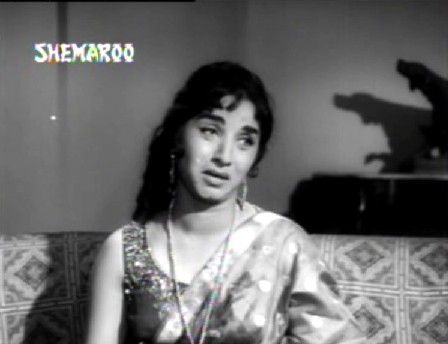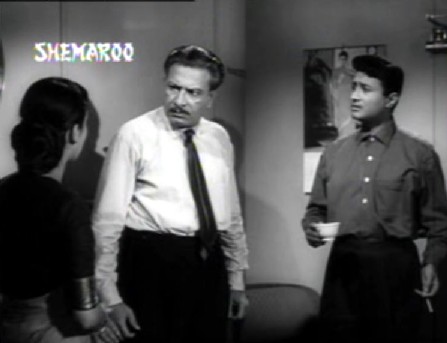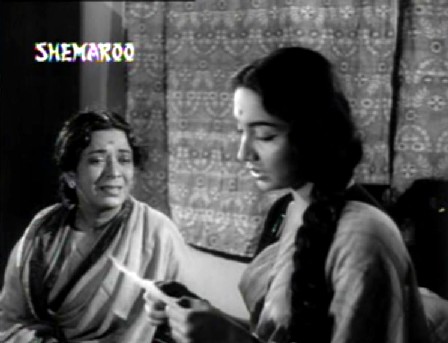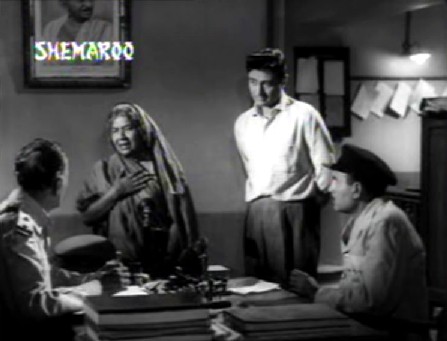I tend to associate Hrishikesh Mukherjee with films that focus on the everyday lives of people like you and me (I’m assuming here that you aren’t a multimillionaire, a film star or something equally glamorous; I’m not, at any rate). Anupama, Anuradha, Anand, Satyakam—all of them amazing films whose protagonists are very real. Asli-Naqli is perhaps a little different, because it begins in the world of the spoilt young heir of a very rich man.

Anand (Dev Anand) is the grandson, heir and only living relative of starchy old millionaire Dwarkadas (Nasir Hussain). Anand is the sort who only comes to office to ask his grandfather for more money—which he blows up on the racetrack, at bars, or at nightclubs. Anand, we realise within the first couple of scenes, isn’t a bad guy, just thoroughly irresponsible and out to have a good time.
Dwarkadas, however, has plans to put a stop to Anand’s revelry: he’s arranged a marriage between Anand and Rekha (Indira), the silly daughter of a sugar baron.

Anand avoids Rekha like the plague. This eventually cheeses off Dwarkadas (as does Anand’s ceaseless carousing), and we have the inevitable showdown. Dwarkadas accuses Anand of being a worthless good for nothing; Anand hits back by saying he’s this way because grandpa brought him up this way. Touché.
The long and the short of it is that Anand leaves the house in a huff and wanders away onto the streets.

Some hours later, Anand (who’s been snoozing on a park bench) is hauled up by a cop for vagrancy. A passerby called Mohan (Anwar Hussain) comes to Anand’s rescue, and discovering that Anand is homeless, jobless and hungry, takes Anand to his own home. Mohan’s younger sister Shanti (Sandhya Roy), very sharp-tongued but good at heart, ends up `adopting’ Anand as her brother.

Anand soon makes friends with Mohan’s neighbour Nandu (Mukri), and the others in the neighbourhood. He also meets the lovely Renu (Sadhana), who comes by every evening to teach the poor people basic English, mathematics and so on. Anand teases Renu by pretending to be illiterate, and gets her quite annoyed.

Anand has been spending most of his days searching for a job. The day after he meets Renu, he runs into her again, this time at the office of a textile manufacturing company where he’s come looking for a job. The manager (Hari Shivdasani) and his assistant Mr Gomes (Keshto Mukherjee) mistake Anand for the Mr Anand, an important client they’re expecting. Anand is being plied with cigarettes and coffee when Renu—secretary to the manager—walks in and recognises Anand.

Anand gets kicked out, but he tells Renu the truth: that he’s a graduate, needs a job desperately, and had been looking for a job. Renu is suitably remorseful. The real Mr Anand has arrived in the meantime, and has awarded the company a valuable contract. Renu goes to her boss, the manager, and convinces him that this contract’s come their way because of Anand: he’s a mascot, a good luck charm, and shouldn’t they give him the job he sorely needs?

The manager’s mollified and agrees, but the only job available is that of a stenographer, someone who knows shorthand and typing. Egged on by Renu, Anand agrees, and the job is his. Renu helps cover up for him by doing his work while she makes him practise typing. In the evenings, they meet at Renu’s classes in Mohan’s neighbourhood. And (what else should one expect?), they fall in love.

But something strange is happening in Renu’s life. When she gets home from office, she drops a letter into the letterbox outside her home. Her mother (Leela Chitnis) asks Renu how her day at college was, and then bemoans the fact that Renu’s father hasn’t written to them in a while. Renu sends her little sister off to the letterbox to retrieve the letter, which she reads out. It purports to be from her father, and says that he’ll come home once his work is over.
Something fishy here.

Meanwhile, the boss discovers Anand can’t take dictation or type for nuts, and Anand’s fired. He plods around town looking in vain for a job, and even tries walking out of Mohan and Shanti’s home when he finds Shanti selling off her jewellery to buy food for them. But Mohan and Shanti won’t let him go (“We’ll share our sorrows and our poverty”), and Anand is very touched by their selflessness.

He tries to pass on the benevolence, but it misfires. On a train, trying to slip some money into the purse of a poor old woman who’s been caught travelling without a ticket, Anand himself is pounced upon—everybody thinks he was robbing the old woman. Renu comes to bail him out; the old woman reveals the truth and gets Anand acquitted.

Renu now tells Anand her story. It turns out that Renu had an elder brother, for whom her parents had great ambitions. To provide money for an expensive education for his son, Renu’s father went away to Africa to work.
Three years back, says Renu, her brother suddenly fell ill and died. Renu’s father took the next flight home—and died in a plane crash. Renu, whose mother went into shock at her son’s death, was told by the doctor that the trauma of being widowed would be too much for her mother. Therefore the pretence that Renu’s father is still alive and well, and periodically sending them money.

With that off her chest, Renu drifts even closer to Anand. And there’s more good news around the corner: Nandu has managed to find Anand another job, this time as the driver of a school bus.
But can the good times last? How long can the truth be hidden—by Renu, about her father; and by Anand, about who he actually is? What’s Dwarkadas doing all this while? And how will Mohan, Shanti, Nandu and all the other people who’ve taken Anand into their homes and their hearts react when they discover who he is?
What I liked about this film:
The music, by Shankar-Jaikishan. My favourite is Tujhe jeevan ki dor se baandh liya hai, but there are plenty of other lovely tunes as well: Gori zara hans de tu is particularly sweet.
Sadhana, one of my favourites. She’s excellent in this film: very pretty in a wholesome, girl-next-door way, and a good actress to boot.

Sandhya Roy: I last saw her in the awful Pooja ke Phool, and wasn’t expecting much from her in Asli-Naqli, but she does a very likeable Shanti, sharp-tongued and brusque, but also sensitive and sweet.
And Dev Anand, of course. Like Shammi Kapoor, he’s an actor whose 50’s and 60’s films I can generally depend upon for good entertainment value—and he delivers in this one.
What I didn’t like:
The character of Anand was puzzling. This man, when he’s staying with Mohan and Shanti, is dependent on them for his every meal until he finds a job—and then he doesn’t make much of an effort to retain the job. When he loses the job, Anand doesn’t seem too perturbed—and when he finally gets another job: well, it’s the same story all over again.
On the one hand, Anand’s rejecting all his wealth; on the other, he’s doing precious little to earn a living for himself. Why? An unsolved mystery, which left me feeling vaguely irritated.
Not one of Hrishikesh Mukherjee’s very best films, but yes, watchable enough. It lacks the subtle insights into human nature that you’ll find in films like Anupama or Anuradha, but it’s a pleasant, simple tale—and as I said, the songs are worth it.

Hrishikesh Mukherjee directed this?!! That’ll teach me to fast forward the opening credits all the time! ;-)
This one has the best of songs and pretty people. Sadhana looked lovely (I always liked her de-glam appearance way better than her Waqt-glamor) and Dev was super handsome here. But I thought the movie wasnt quite as engrossing as some of his others. I liked their other pairing – Hum Dono – way better. And that actress is Sandhya Roy? I always thought of V. Shantaram’s final wife (his leading lady in Do Aankhen Barah Haath, Navrang, etc.) as Sandhya Roy!
LikeLike
Yes, I agree completely – Hum Dono is way better than Asli-Naqli. This was kinda tepid, if you know what I mean: not what I’d expect of a Dev Anand-Sadhana pairing.
V Shantaram’s wife was a Sandhya too – I remember seeing a couple of films of hers (including Do Aankhen Baraah Haath) when I was a kid; awful actress and not that great-looking either, but a very good dancer. Sandhya Roy, from what imdb suggests, was more at home in Bengali films.
LikeLike
Sadhana looked so beautiful, much better than her hip-mode!
this movie is somehwat onthe same lines like maya, isn’t it?
LikeLike
Yes, in fact I was reminded of Maya when I saw it, though I think Maya (all that I remember of it; it’s been a long time since I saw it) was a little more sad. Lovely music, though.
LikeLike
listen to the prelude to jaa re, jaa re udd ja re pancchi!
LikeLike
Absolutely! I also like Koi sone ke dilwaala.
LikeLike
Sandhya was unofficially the wife of V.Shantaram, the first one being Jayshree whose daughter is Rajshree. Sandhya shot to fame with Jhanak Jhanak Payal Baaje and was a regular with V. Shantaram’s movies, including Do Aankhen Barah Haath, Sehra, Jal Bin Machlee Nritya Bin Bijli…. She was less of an actress and more of a dancer.
LikeLike
Well,sandhya roy is completely different from V.shantaram’s wife Sandhya.Sandhya roy is one of my favs.Her sweetness and innocence almost kills me.Sandhya Roy had a leading role in Satyajit Ray’s Ashani Sanket[considered among his best films].You can search for one of Sandhya roy’s most popular songs-Tumi robe nirobe on youtube.This song is one of the most popular,admired,respected and loved songs among the bengalis.Watch it for sure,you would not be disappointed.Music and lyrics for this song is by Rabindranath Tagore.
p.s:I am not posting any links as i am awful at posting links.
LikeLike
Yes, of course. Sandhya Roy was in this film (Asli-Naqli) and in the awful Pooja ke Phool too – though in both films, I did think she acted very well. Of course I know she wasn’t V Shantaram’s wife Sandhya – that was a totally different woman, as Nasir says more a dancer than an actress.
I have seen Tumi robe nirobe earlier too (Kuheli was a Bangla version of Kohraa, wasn’t it?) Lovely song. Here it is, for anybody who wants to have a look and/or listen:
LikeLike
well,it’s quite a big misconception among people that Kuheli is a version of Kohraa.They have no similarities apart from the fact that both are spooky thrillers where the husband thinks that he had killed his wife[or does he actually kills his wife?].Maybe, since Biswajeet was the hero of both films,this misconception probably arised.Otherwise the storylines of both the films are very different.Anyways,kuheli is a very good film with very good performances by biswajeet,sandhya roy ,sumita sanyal[heroine of anand,aashirwad] and ajitesh.Also Biswajeet-Sandhya Roy pair was very popular among bengalis back then.They both look innocent,cute people with a certain vulnerability to them and both complement each other very well.
p.s:i found pooja ke phool AWFUL,barring the songs.When a film is this awful,no actor can save the film,no matter how good he/she is.
note-YOU CAN FIND THE ENGLISH TRANSLATION OF THE BENGALI LYRICS OF THIS SONG.THE LYRICS OF THIS SONG HAS GREAT MEANING.I THINKENGLISH TRANSLATION OF THE LYRICS IS IN THE COMMENTS SECTION OF THE VIDEO LINK YOU HAVE GIVEN.
LikeLike
Thank you for clearing that up for me, Raunak! I remember watching this song on Youtube maybe a couple of years back, and I think someone had commented there that it was a remake of Kohraa… but it still sounds very interesting! I hope I’m able to get hold of a subtitled version (though I see that the video has been produced by Angel, whose DVDs often have subtitles – so I’m hopeful).
Yes, I saw the translation of the lyrics in the first comment, I think – very beautiful. :-)
LikeLike
asli-naqli and another devsaab film maya are on similar themes,that’s quite well known.But Shammi starrer Dil tera deewana too has a similar theme.Have you seen that one? Interestingly, that one too starred mala sinha like maya.Moreover Dil tera deewana was a remake of Tamil film Shabash Meena which was also remade in malayalam.Personally,i find asli-naqli the best of the lot.now,i am trying to find out which movie possibly inspired all these five films,as i am dead sure that all these films must have borrowed their theme from an old hollywood or european movie.Don’t you think so?
LikeLike
I’ve seen all three Hindi films that you’ve mentioned (incidentally, the Shammi Kapoor starrer Prince also has a somewhat similar theme – a rich and powerful man pretends to be poor), but I haven’t seen the Malayalam or Tamil versions. One Hollywood film (which I must admit I haven’t seen) that seems to have a similar plot is It Happened in Paris (1935):
http://www.imdb.com/title/tt0026536/
LikeLike
Hrishida is one of my absolute favourite directors and unlike most directors who seem to peak at the start of their careers, he seemed to get better over the course of the 50’s and 60’s. My favourite of his has to be Anupama, but even in the 70’s he was making films that truly deserve to be called classics.
For me Asli Naqli was memorable for the insanely luminous Sadhana, and Tera Mera Pyar Amar :-)
I’ve seen most of Hrishida’s films now – the few I still need to see are:
Kotwal Saab
Arjun Pandit
Sabse Bada Sukh (I have this)
Khubsoorat (I have this too)
I think I’ve seen just about everything else of his listed on IMDB (except Lathi but there is no info about that…)
LikeLike
Anupama is one of my two favourite Hrishikesh Mukherjee films too, but it ties with Chupke-Chupke. :-) And Golmaal comes in a very close second.
LikeLike
I didn’t mind Asli-Naqli, it was decent and watchable; which is good thing for me given my deeply method of choosing films based on solely looking at directors/actors. If there’s a director, actor or actress that I like involved with the film I’ll watch it. I’ve been burned many times, recently I watched Mere Hamdam Mere Dost based on the actors that were in it. Such a dumb movie it easily has some of the stupidest characters I have ever seen in a movie (I wrote all about it –that’s how terrible it was).
This is the same method in choosing this film. I basically only picked it up because I saw the names Hrishikesh Mukherjee, Sadhana and Dev Anand in the description. I’m glad it turned out to be a decent movie– I consider it a good thing whenever I finish a movie without feeling like I wasted 2 1/2 hours of my time.
Also, I didn’t find Anand’s flakiness when it came to working/holding down a job annoying. I came to the conclusion that he was trying to make a point by denouncing his wealth, but he was having a hard time because he was used to not having to work for what he wanted. (and because it kind of reminded me of myself when I was 22 years old and insisted that I go away for grad school on my own dollar. Reality hit me really hard, adapting to the “real world” without the advantage of nepotism/family name or the family’s money was not fun at all).
My friend on the other hand was, like yourself, irritated by Anand’s lack of work ethic and the lack of a proper explanation in the film–he claim’s its due to poor character development, which is probably closer to the truth than my explanation is lol.
LikeLike
I guess it’s really all very subjective. And – as you mention, when you cite that example of your own life – our personal perceptions and experiences do tend to colour what we see.
But if everybody were to like the same things, what a boring world it would be, right? :-)
LikeLike
That’s the beauty of films, our viewing experiences are as colourful and diverse as our personal frames of reference are. I love that my hindi-film buddy and I can watch films together and argue over them–indeed it would be boring if he always agreed with me! So far there are only 2 films we have matching opinions on–the awesomeness of Amar Akbar Anthony and the stupidity of Mere Hamdam Mere Dost–otrher than those two films we constantly compare our list of favourites and make fun of each others choices lol.
LikeLike
That’s a coincidence, you mentioning the ‘awesomeness of Amar Akbar Anthony, because I’ve just finished writing the review of Sidharth Bhatia’s book about that film. Will be posting it on my website (www.madhulikaliddle.com) later today.
LikeLike
only one question in this film that Renu one day is absent from work. does she deliberately misses the offices so that anand is caught that he doesn’t know short hand and always renu does for him.how she could be so relaxed about missing the office . then anand should have also taken the off. i feel anand never tries hard for job cause he knows he has a back up. like nasir hussain in negative father. he was the famous father of 60s films. according to hrishi da this movie was commercial potboiler and it is true. also don’t hrishi da like glorifying poverty like most of the old movies did.
LikeLike
Shut up you idiot critic..it’s a movie class apart…
LikeLike
How charmingly well-behaved you are. :-)
LikeLike